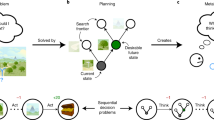Abstract
Agents face serious obstacles to making optimal decisions. For instance, their cognitive limits stand in the way. John Pollock’s book, Thinking about Acting, suggests many ways of revising decision principles to accommodate human limits and to direct limited, artificial agents. The book’s main proposal is to replace optimization, or expected-utility maximization, with locally global planning. This essay describes optimization and locally global planning, and then argues that optimization among salient options has the virtues of locally global planning without certain drawbacks. Although it does not endorse locally global planning, it recommends that decision theory incorporate some of the book’s ideas about settling for improvements when optimization among all options is unrealistic.
Similar content being viewed by others
Notes
My terminology differs from Pollock’s. Pollock uses ‘act’ for a concrete event and ‘action’ for an event-type (148). He notes that deliberation treats event-types rather than concrete events. Hence he takes deliberations to be about actions, not acts. His distinction between acts and actions is similar to the distinction between acts and possible acts. Decision theory for brevity often refers to possible acts as acts. I follow that custom. A proposition represents an act and the content of a decision. Deliberation is about acts, some of which are not realized. Also, Pollock distinguishes expected value, which applies to a comprehensive course of events, and expected utility, which is marginal expected value taking the status quo as a reference point (159–163). Locally global planning uses expected utility, so it need only compare, and not calculate, worlds’ values. Following tradition, I use expected utility for an assessment of both acts and worlds with respect to an agent’s goals and do not assume any particular reference point for the assessment. Pollock introduces a novel type of probability to calculate expected utility, but its features do not affect points about optimization that this essay reviews.
References
Kavka, G. (1983). The toxin puzzle. Analysis, 43, 33–36.
Sobel, J. H. (1994). Taking chances: Essays on rational choice. Cambridge: Cambridge University Press.
Weirich, P. (1983). A decision maker’s options. Philosophical Studies, 44, 175–186.
Weirich, P. (2004). Realistic decision theory: Rules for nonideal agents in nonideal circumstances. New York: Oxford University Press.
Author information
Authors and Affiliations
Corresponding author
Additional information
For a Philosophical Studies symposium on Thinking about Acting by John Pollock.
Rights and permissions
About this article
Cite this article
Weirich, P. Optimization and improvement. Philos Stud 148, 467–475 (2010). https://doi.org/10.1007/s11098-009-9490-7
Published:
Issue Date:
DOI: https://doi.org/10.1007/s11098-009-9490-7




